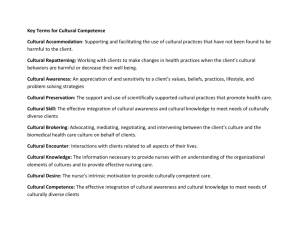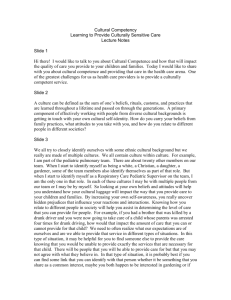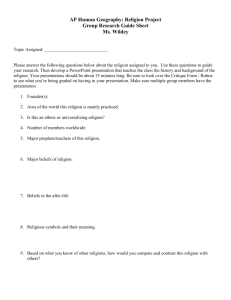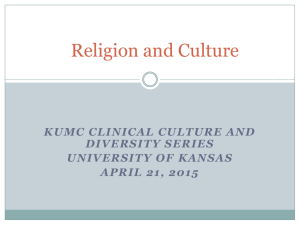Culturalcomp_ guestlec
advertisement
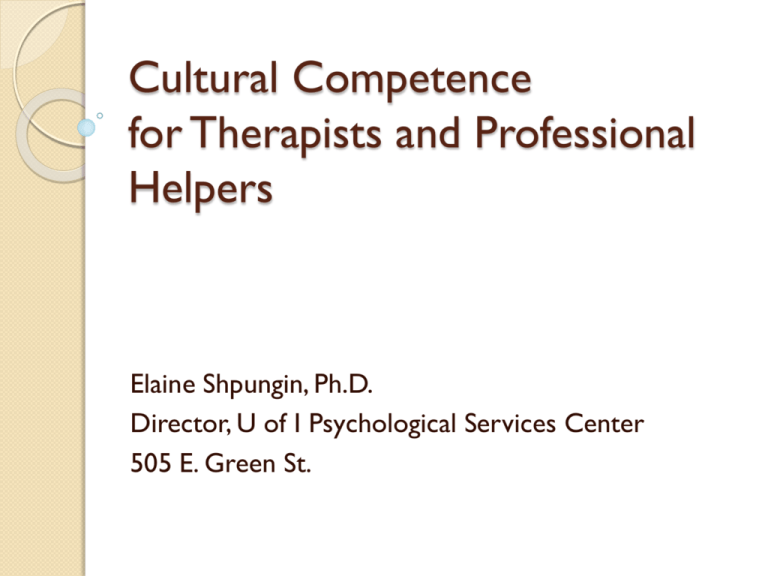
Cultural Competence for Therapists and Professional Helpers Elaine Shpungin, Ph.D. Director, U of I Psychological Services Center 505 E. Green St. Self Reflection Imagine yourself going into a setting where you want to volunteer or work to help others (e.g., school, shelter, jail, fraternity/sorority, childcare center). What is one fear/anxiety you have about working with this group of people? What is one thing that motivates/excites you about working with this group of people? Why cultural competence might matter in that setting People of color (and living in poverty) are less likely to seek and receive mental health and other services If they seek services, they are more likely to be mis-diagnoses and to receive inappropriate or even harmful services They are also more likely to find the help to be “culturally oppressive” – even when helper is well meaning Cultural competence requires individual providers at a minimum to (Cross et al., 1989): Acknowledge cultural differences Understand your own culture Engage in self-assessment Acquire cultural knowledge & skills View behavior within a cultural context Culturally and linguistically competent providers use more appropriate: Assessment and diagnostic tools Treatments & interventions Education & counseling approaches And are more likely to consult with: traditional/indigenous practitioners natural healers “cultural brokers” They are also more likely to: Take on stereotypes, bias, discrimination, prejudice, and other ISMs. Work toward health and mental health equity and social justice. Advocate for these principles among your peers and with groups they belong to. But HOW do I do all this? Cultural and Linguistic competence is not a Destination It is an ongoing process (dance) between increasing your Knowledge and modifying your Actions A. Increasing Knowledge (2-part) 1. Self-Awareness Learning more about: your social location (race, gender, sexual orientation, socio-economic class) family, social, cultural influences on you your beliefs about your social location (including fears, hopes, wishes, expectations) your beliefs about others’ social location (including fears, hopes, wishes, expectations) A. Increasing Knowledge cont’d 2. Group and Structural Awareness Learning about: oppression, power, privilege specific “isms” and their intersection structural vs. interpersonal inequities and power-dynamics culture-specific information about other groups (including group-level history, preferences, beliefs, experiences) B. Modifying Actions (2-part) 1. Attending to your Intention Focusing on reciprocity, mutuality (exploring and meeting where needs overlap) Approaching others as co-partner or ally (meaningful inclusion, consideration, choice of all voices) B. Modifying Actions cont’d 2. Attending to your Approach: authenticity, warmth vulnerability, transparency (especially if structural power-differences) seeking humanization of self and other (e.g., via curiosity, mutual comprehension, appreciation) Try it Out (5 Questions) Imagine yourself going into a setting where you want to volunteer or work to help others (e.g., school, shelter, jail, fraternity/sorority, childcare center). 1. Write down 2 “positive” and 2 “negative” beliefs you have about the people you’d be working with, as a group: 2 “Positive” beliefs a. b. 2 “Negative” beliefs a. b. 2. Write down two differences between your social location or demographics and theirs, on average (gender, sexual orientation, socio-economic status, race, ethnicity, etc.) a. b. 3. Write down two ways in which power and privilege typically operates between mainstream society and this group (isms, beliefs, stereotypes, power differentials, laws, policies that affect them) a. b. 4. Write down how mutuality could occur between you and this group. What might be your needs for this encounter or relationship? Theirs? What gifts or skills do you have to contribute? What might you wish to gain from them? Where might there be OVERLAP between your needs and theirs, what they want and what you want? (this last bit is the place where connection is most likely to flower) 5. Write down your wishes and hopes for your work together in “positive” language (what you want to happen rather than avoid or prevent). Feedback! What is one thing you are taking away with you today? Further Resources National Center for Cultural Competence ◦ http://nccc.georgetown.edu/ Office of Minority Health (U.S. Dept of Health and Human Services) ◦ http://minorityhealth.hhs.gov/ ◦ Click Cultural Competence tab in top menu




